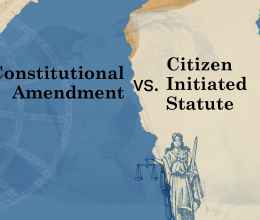Below is our Chief Lobbyist Gary Daniels' opponent testimony on Sub. House Bill 215. This was delivered to the House Criminal Justice Committee on February 26, 2020.
To Chairman Lang, Vice Chair Plummer, Ranking Member Leland, and members of the House Criminal Justice Committee, thank you for this opportunity to present opponent testimony on Substitute House Bill 215.
So this committee is aware, the ACLU of Ohio likely would have testified as interested party on the as introduced version of HB 215. But, changes in sentencing law recently added to HB 215 leave us no choice but to now oppose this bill.
Sentencing Changes
During the most recent hearing on HB 215 (Feb. 13, 2020), the Office of the Public Defender gave comprehensive testimony before this committee about the negative ramifications of the new sentencing changes now part of this bill. To recap, HB 215 feeds Ohio's mass incarceration crisis by:
- Causing disparate sentences for the same behavior. Specifically, HB 215 does this by treating differently defendants with multiple charges depending on whether the charges originate from one or separate indictments. Under HB 215, prosecutors will undoubtedly bring charges via multiple indictments to maximize prison time. Such a change increases the power of prosecutors even more and reduces the power of our courts. And;
- Increasing the length of minimum sentences. Currently, when someone is serving one or concurrent sentences, they are entitled to a presumption of release after serving their aggregate minimum prison term. Sometimes, the Dept. of Rehabilitation & Correction may, but is not required to, rebut that presumption. HB 215 requires DRC to rebut the presumption of release against those serving consecutive sentences. As the OPD points out, this will increase the length of minimum
Suffice to say, passage of HB 215 will lead to more people in prison and for longer periods oftime. This is done in the context of a dangerously overcrowded prison system requesting an additional $1 billion+ in capital funding over the next several years separate from the nearly $2 billion per year of taxpayer money DRC already receives.
APA Changes
On a positive note, HB 215 seeks to address burdens on the Adult Parole Authority. Ohioans released from prison benefit from individualized attention and efforts to positively reintegrate them back into society. Over the years, decreases in staffing combined with dramatic increases to caseloads ensure such attention and positive efforts remain in short supply.
HB 215 requires the APA to set and abide by caseload standards. The ACLU of Ohio sincerely hopes this effort brings welcome and needed change to the current system. Of course, a great way to reduce APA's caseload is to reduce the amount of people going to prison in the first place.
HB 215 also tasks the Ohio Criminal Sentencing Commission with creating an Offender Supervision Study Committee to study and report on parole, community control, probation, community corrections, and related issues. We also hope this provides beneficial. However, we also note that among all the specific parties and people HB 215 designates to serve on the committee, there is zero mention of the very people who have been on such supervision. Surely, they would provide a needed perspective on this issue and they, too, should be included.
GPS Monitoring
The ACLU of Ohio is skeptical the changes proposed in HB 215 regarding GPS monitoring will prove beneficial. Instead, we fear they will be counterproductive and/or ultimately harmful.
HB 215 significantly increases the size and scope of GPS monitoring of many people released from Ohio prisons. The belief is that increased and additional monitoring of this type will serve public safety. But even the Governor's Working Group on Post-Release Control report (conducted by the Univ. of Cincinnati) is not convinced this is true due to a lack of research and data on this fundamental point.
But we do know what HB 215 proposes in this regard will increase costs and bureaucracy. It will also increase the scrutiny of many more who have left prison. Our concern is such scrutiny will result in Ohioans going back to prison for minor or technical violations of post-release control. Ohio already struggles with this very issue; HB 215 will increase this problem.
In conclusion, the ACLU of Ohio believes the intentions behind HB 215 have merit. Everyone wants a safe Ohio. But this bill works against its own purported goals. We urge rejection of Substitute House Bill 215.








